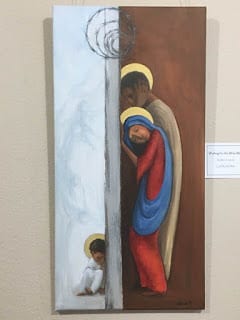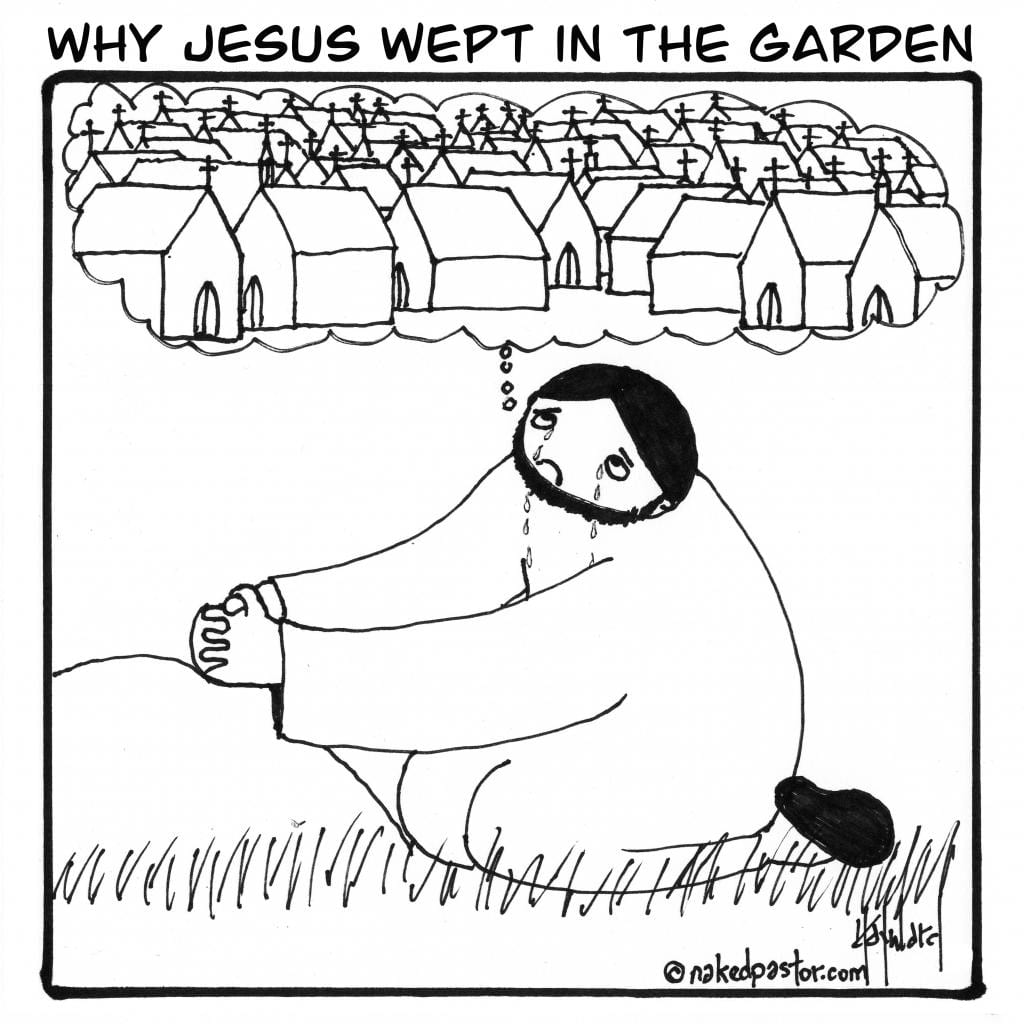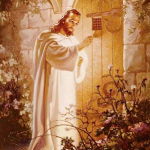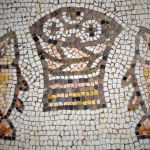Waiting
“Advent” is a word I was unfamiliar with as a child growing up in my Baptist tradition. But in my years with the Mennonites, I became familiar with the ritual of lighting candles on the Advent wreath in anticipation of Christ’s nativity.
Advent, I learned, meant arrival but intrinsic to that word was the waiting, the anticipation and the longing of God’s people for his appearance and especially his deliverance. As a little boy, I relived that expectant hope as the calendar slowly edged forward to Christmas.
Sometimes Waiting is Hard
I think most children find waiting for the climax of Christmas morning difficult … but they may also enjoy the waiting itself as they experience the whole season as a wonderland of lights, sweets and intoxicating anticipation.
Still, in our culture and in our lives, waiting can be very hard. On top of the frenetic pace and exhausting demands of our 21stcentury society, the Christmas season adds a new dimension of scurrying. I become more sensitive to long traffic lights, slow download speeds and snail-paced line-ups. I become more demanding of others—where’s my fast-food order? Why hasn’t he replied to my text yet? When is she picking me up? Checking my watch every two minutes.
Beyond these trivialities, waiting for important news can be excruciating. Applications are brutal … applying for jobs, applying for housing, applying for school, applying for work permits or scholarship funds or debt forgiveness. Waiting!
And then there’s waiting for medical results. What did the lab say? A second opinion? How long? Three weeks? Good grief! Waiting can be very hard.
Negative Effects of Waiting
We may experience serious negative effects of waiting in our body, soul and spirit:
- We may have a spike in anxiety that affects our sleep and our appetite.
- Waiting may also trigger feelings of frustration, which is really a kind of anger, especially at whatever or whoever is prolonging or even blocking our path.
- Chronic waiting may walk us into grief and groaning.
- Eventually, waiting may settle into depression and despair.
- We may even lapse into a hard cynicism or self-defeating victim narrative.
Cries of despair echo around the globe as so many wait in apparent futility for relief from chronic poverty and illness, constant hostility and continual war.
How Do We Wait?
How shall we respond to the moans of those whose waiting has ground them down?
First, I think we must BE WITH THEM. The promise of a virgin-born child named Emmanuel was to say that God is not distant or deaf to our groaning prayers. He is “God with us” … and not in some magical misty fog of abstracted presence. No, he is with us, embodied as those who willingly co-suffer with the broken. It means weeping with those who weep rather than rushing to fix them with empty platitudes. When we hear their story, we bear it with them, as God-in-Christ did and does.
Second, we do our best not to silence their lament. The complaints of those who wait in grief can be messy and it’s tempting to correct them when we hear B.S. about God or the world or themselves spewing out of their mouths. But those toxic beliefs need a wait out, need to be given voice as part of the detox. We need to practice nonjudgmental listening in the presence of our unrattled God. And we need to offer up our own honest laments without fear.
Third, we join in the waiting with a call for deliverance, committing to not growing bored or jaded and simply moving on when the wait seems too long. “How long?!” is the legitimate, weeping cry of many in our world today. Let’s cry it with them.
Melanie
At the age of 14, Meagan made a commitment to follow Jesus. On that same day, she became bed-ridden with an illness that persisted for weeks. Eventually, she was diagnosed with chronic fatigue and fibromyalgia. Although she drenched her bed with tears and prayers every day, waiting for her deliverance, she saw no improvement, miraculous or medical. When I met her, seven years later, she was a sick 21-year-old whose entire teen years had been stolen.
The disease was bad enough, but associating its arrival with the day she became a Christ-follower was horrid. What sort of gift is that? It was remarkable to me that she hadn’t bailed on God at some point. But here she was, asking for prayer at a discipleship training school where she would drag herself to class with the few hours of energy she could must each day.
We sat down facing each other, knee to knee. I took her hands in mine and confessed to her, “I hate this disease. I feel helpless. I can’t fix you or heal you. But I can sit with you and cry with you and encourage you to give voice to your sorrow.” Then I asked her to read two Psalms to me out loud in her first language (French). This is what she read:
Psalm 6
1 Lord, do not rebuke me in your anger
or discipline me in your wrath.
2 Have mercy on me, Lord, for I am faint;
heal me, Lord, for my bones are in agony.
3 My soul is in deep anguish.
How long, Lord, how long?
4 Turn, Lord, and deliver me;
save me because of your unfailing love.
5 Among the dead, no one proclaims your name.
Who praises you from the grave?
6 I am worn out from my groaning.
All night long I flood my bed with weeping
and drench my couch with tears.
7 My eyes grow weak with sorrow;
they fail because of all my foes.
8 Away from me, all you who do evil,
for the Lord has heard my weeping.
9 The Lord has heard my cry for mercy;
the Lord accepts my prayer.
10 All my enemies will be overwhelmed with shame and anguish;
they will turn back and suddenly be put to shame.
Psalm 13
1 How long, Lord? Will you forget me forever?
How long will you hide your face from me?
2 How long must I wrestle with my thoughts
and day after day have sorrow in my heart?
How long will my enemy triumph over me?
3 Look on me and answer, Lord my God.
Give light to my eyes, or I will sleep in death,
4 and my enemy will say, “I have overcome him,”
and my foes will rejoice when I fall.
5 But I trust in your unfailing love;
my heart rejoices in your salvation.
6 I will sing the Lord’s praise,
for he has been good to me.
Melanie read through both Psalms aloud, sobbing as line after line described her life, her disease and her broken heart to a T. The only gift God gave her that day was the empathy he put in my heart so that I could weep with her and not try to repress her emotions. Oh, and through David, he also gave her the gift of words to say out loud what she had felt inside, moving from and through blaming God for her sickness to expressing blind trust in his goodness.
The next day, I led a prayer exercise with the group in which we all brought our burdens to the foot of the Cross and met the risen Christ to make an exchange. We asked him to lift our heavy loads and give us his gifts in their place. Melanie participated and we said our goodbyes. I’ve not seen her in person since that day.
Sometimes Waiting is Really Good
So far, I’ve emphasized how difficult waiting can be. But waiting is also incredibly important to human development. I recently brainstormed the positive effects of waiting with a congregation in Regina, Canada. They offered the following list of positive impacts of waiting.
- Waiting develops patience, endurance and resilience
- Waiting creates longing and increases expectancy
- Waiting builds gratitude for what we’ll receive.
- Waiting prepares our hearts and readies us to receive.
- Waiting increases our capacity to receive … enlarging our hearts.
- Waiting cleanses us as we let go of lesser desires or attachments.
- Waiting deepens faith in the goodness of God despite delays.
Many times when I or others are waiting on God, we complain that it’s going too slow and ask why God can’t pick up the pace a bit. The sense I’ve had again and again is that God is going as fast as we can. He longs for us to receive the grace that’s already ours but can only deliver that to the degree we can receive it. In other words, he’s honoring the pace of our growth.
Advent Waiting
Back to Advent. Why is it that we step into Israel’s story each Nativity season? Because it is our story too.
As the Jews were waiting and longing for their Messiah to restore the kingdom of Israel, so too, we wait for Christ’s arrival to restore this world. Century after century they wait. Remember, they waited 400 years for deliverance from slavery in Egypt! And then later, they were exiles in Assyria and Babylon. And then even when they returned to the land, they lived under Greek and then Roman imperial occupation.
We, too, have been waiting. Whatever expression the glorious return of Christ is meant to take, 2000 years of waiting have left us wondering, “How long, O Lord?” How many times have we mistakenly set dates, despite Christ’s warning, and ran aground on our own impatient predictions? Sometimes we make up such silliness because we’re bored or because it makes for good book sales. More legitimately, whenever and wherever the church has experienced great tribulation and persecution, the martyrs under the altar cry out, “How long?” from sheer desperation.
Revelation 6 – “How Long?”
9 When he opened the fifth seal, I saw under the altar the souls of those who had been slain because of the word of God and the testimony they had maintained.10 They called out in a loud voice, “How long, Sovereign Lord, holy and true, until you judge the inhabitants of the earth and avenge our blood?” 11 Then each of them was given a white robe, and they were told to wait a little longer, until the full number of their fellow servants, their brothers and sisters, were killed just as they had been.
Sometimes Waiting Gives Way to Arrival
The good news is that sometimes our waiting gives way to arrival. Advent reminds us that although we wait for our Savior to return, he’s also already come. This was the experience of Simeon and Anna when Mary and Joseph brought Christ to the Temple as an infant:
Luke 2
22 When the time came for the purification rites required by the Law of Moses,Joseph and Mary took him to Jerusalem to present him to the Lord 23 (as it is written in the Law of the Lord, “Every firstborn male is to be consecrated to the Lord”), 24 and to offer a sacrifice in keeping with what is said in the Law of the Lord: “a pair of doves or two young pigeons.”
25 Now there was a man in Jerusalem called Simeon, who was righteous and devout. He was waiting for the consolation of Israel, and the Holy Spirit was on him. 26 It had been revealed to him by the Holy Spirit that he would not die before he had seen the Lord’s Messiah. 27 Moved by the Spirit, he went into the temple courts. When the parents brought in the child Jesus to do for him what the custom of the Law required, 28 Simeon took him in his arms and praised God, saying:
29 “Sovereign Lord, as you have promised,
you may now dismiss your servant in peace.
30 For my eyes have seen your salvation,
31 which you have prepared in the sight of all nations:
32 a light for revelation to the Gentiles,
and the glory of your people Israel.”
33 The child’s father and mother marveled at what was said about him. 34 Then Simeon blessed them and said to Mary, his mother: “This child is destined to cause the falling and rising of many in Israel, and to be a sign that will be spoken against, 35 so that the thoughts of many hearts will be revealed. And a sword will pierce your own soul too.”
36 There was also a prophet, Anna, the daughter of Penuel, of the tribe of Asher. She was very old; she had lived with her husband seven years after her marriage,37 and then was a widow until she was eighty-four. She never left the temple but worshiped night and day, fasting and praying. 38 Coming up to them at that very moment, she gave thanks to God and spoke about the child to all who were looking forward to the redemption of Jerusalem.
Yes, we wait for his appearing to restore all things and many of us wait to restore the broken places of our lives, but we also proclaim his arrival. Emmanuel is “God with us,” not “God was with us.” We welcome his presence whenever two or three gather in his name. And in my own faith tradition, after contemplating and receiving the presence of Christ in Communion, we pray the words of Simeon:
Lord, now let Your servant depart in peace, according to Your word; for my eyes have seen Your salvation, which You have prepared before the face of all peoples, a light to bring revelation to the Gentiles, and the glory of Your people Israel.
We recognize that Christian worship is about “God with us,” and not only “God not yet here.”
Why Simulate the Story Each Year?
Thus, we relive the Advent story to remember that even as we wait for Christ’s return, yet we celebrate the good news that he’s already come. And conversely, though Christ has already come, we remind ourselves that we wait for his appearing to restore all things and pray that he will restore our lives in the here and now.
It must have been four years after I met with Melanie that she reached out to me through Facebook. She wrote to say that she wasn’t sure if she’d ever told me … the day she took her burdens—physical, emotional and spiritual—to the Cross to exchange them for Christ’s gifts, her Advent waiting turned to arrival. She recounted how on that very day, Christ healed her of the chronic fatigue and fibromyalgia—completely. And the gift he had given her was a new life. Yes, she got her life back. And now she was sending me the evidence of God’s goodness. She surprised me with a family photo of her with a husband and their first newborn, a miracle she never dreamed of when we’d wept through her losses.
I wish all the Melanies out there would experience arrival. But until they do, we wait, we groan and we pray. And we remember that it’s not all just about us and our waiting. Did you know Christ is waiting for us in those who wait this season?
Advent Justice

Finally, friend Kenneth Tanner calls me to see in Advent how the world groans and waits for Christ to be revealed through us as kingdom builders and peacemakers. I couldn’t say this better so I’ll give him the last word:
“Advent is misunderstood as simply a preface to Christmas. The incarnation is its own great and beautiful mystery. Advent is no less wondrous for it is about waiting for God to return to his creation as judge. Advent is about an unveiling, rectifying, and healing judgment… It’s also about all the countless silenced and oppressed being given a voice and set free and made whole. It’s about a reckoning in which justice comes for victims and victimizers in the form of mercy, where captives our liberated and the blind see, where the poor are vindicated and the mighty are cast down, where, when we allow their good work, the judgments of the All-Merciful restore us to our forgotten identity as divine image-bearers, daughters and sons of God.
“Advent is the church’s reminder that creation still longs for the return of its suffering King. As we enter a frenetic month—a time when we are tempted to rush and to spin ‘round, to embrace fraudulent expectations, to anticipate the arrival of what turns out, in the end, to be nothing if we are in pursuit of nostalgia and the gods of December—let us remember that the true God waits with creation for humanity to welcome the One who yet suffers with the poor in the places of the unwelcome.
“Christ our crucified, risen and ascended Lord is coming to us now and always in the hungry, the naked, the thirsty, the sick, and the prisoner.
“Lee Kaercher’s “Waiting for the Wise Men” is what the world looks like in Advent season—what the Holy Family looks like—waiting for its Maker to judge as only he can judge, for his good judgments which perfect humanity and the cosmos, which burn away from us all that is not of Love.”
Amen.
















